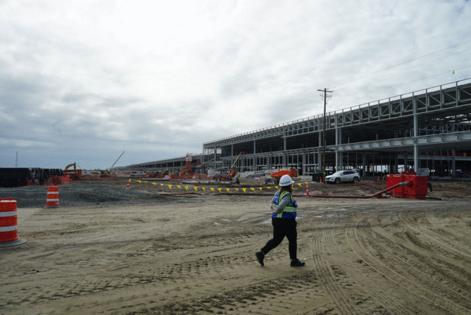Water war waged in Georgia Senate involving Hyundai housing
Published in News & Features
ATLANTA — The Georgia Senate on Thursday addressed one obstacle to residential development near the $7.6 billion Hyundai Metaplant under construction 20 miles west of Savannah, passing a bill that would allow private water systems to service new homes without local government approval.
House Bill 1146 passed by a 32-22 vote and now heads to Gov. Brian Kemp for his signature.
The measure is targeted at Bryan County, where state-imposed limitations on water withdrawals from the Floridan Aquifer have forced the county government to work with a neighboring county, Bulloch, to expand its water system. Bryan and Bulloch counties are in the process of securing permits to drill four Bulloch wells to serve the Hyundai facility and other development tied to the 8,500-worker plant.
New connections to the aquifer are allowed from Bulloch County, but the timetable for the Bryan-Bulloch system remains uncertain.
The slow pace of residential development in the area near the plant, set to open later this year, worries local lawmakers. One developer recently abandoned plans to build a 500-home subdivision in the area, although he cited infrastructure concerns with the city of Pembroke rather than frustration with water connections and the Bryan County government.
HB 1146 sparked the first heated Senate debate of the final day of the legislative session, with Sens. Frank Ginn, R-Danielsville, and Nikki Merritt, D-Grayson, expressing reservations about privatizing water and what it could mean elsewhere in the state in the future. Sen. Ben Watson, R-Savannah, who introduced the bill and represents most of Bryan County, and Sen. Max Burns, R-Sylvania, spoke in support.
“This is an economic development bill,” Watson said. He said Bryan County was not issuing approval letters to private water systems and warned that without the changes to the law, developers would turn to drilling thousands of wells and septic tanks along the coast.
“Part of the role of government is infrastructure and it is working with the private partners, and that’s what this bill does,” Watson said.
Critics say the proposal would undermine local control across a huge swath of South Georgia and could negatively impact drinking water for the region, parts of which are already facing limits on how much water they can draw from the aquifer that supplies much of Georgia, Alabama, Florida and South Carolina. The bill was opposed by the Georgia Municipal Association, the Association County Governments Georgia and the Georgia Association of Water Professionals, as well as environmental groups.
The water utility operator who stands to benefit from the bill, Savannah’s Mark Smith, said the change provides a “relief valve” for short-term development. His company, Water Utility Management, already holds permits for about 50 wells in Bryan County with the capacity to serve about 3,000 new homes in the county.
Smith said he won’t be seeking new permits — which are difficult to obtain due to the state limitations on water withdrawals in Bryan County — but he said he needs HB 1146 to expand service without the county’s approval. His company currently serves 10 subdivisions in Bryan County under previous agreements with the county.
Bryan County officials began withholding permits for private water systems out of fear that providers such as Water Utility Management could undercut the public system once it is built out.
Ginn urged his colleagues to vote against the bill. He said granting private systems new powers would create a “hole” in the local public water system and make it harder for it to meet its obligations. Bryan County representatives told lawmakers during hearings on the bill that the county has already spent about $150 million out of a planned $360 million investment in water and sewer expansion, $120 million of which was being financed with debt.
“In medical terms, we’re killing part of the county,” Ginn said.
_____
©2024 The Atlanta Journal-Constitution. Visit at ajc.com. Distributed by Tribune Content Agency, LLC.







Comments